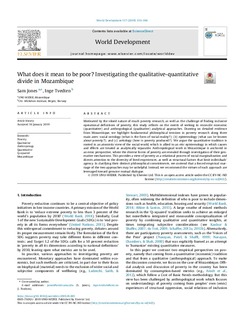What does it mean to be poor? Investigating the qualitative-quantitative divide in Mozambique
Journal article, Peer reviewed
Permanent lenke
http://hdl.handle.net/11250/2582921Utgivelsesdato
2019-01-01Metadata
Vis full innførselSamlinger
- Publications [1488]
Sammendrag
Motivated by the siloed nature of much poverty research, as well as the challenge of finding inclusive operational definitions of poverty, this study reflects on the merits of seeking to reconcile economic (quantitative) and anthropological (qualitative) analytical approaches. Drawing on detailed evidence from Mozambique, we highlight fundamental philosophical tensions in poverty research along three main axes: social ontology (what is the form of social reality?); (b) epistemology (what can be known about poverty?); and (c) aetiology (how is poverty produced?). We argue the quantitative tradition is rooted in an atomistic view of the social world, which is allied to an etic epistemology in which causes and effects are treated as analytically separable. Anthropological work in Mozambique is anchored in an emic perspective, where the diverse forms of poverty are revealed through investigation of their generative mechanisms. This provides a view of poverty as a relational process of social marginalization and directs attention to the diversity of lived-experiences, as well as structural factors that limit individuals' agency. In clarifying their distinct philosophical commitments, we contend that a forced empirical marriage of the two approaches may be unhelpful. Instead, we recommend the virtues of each approach are leveraged toward genuine mutual dialogue.
